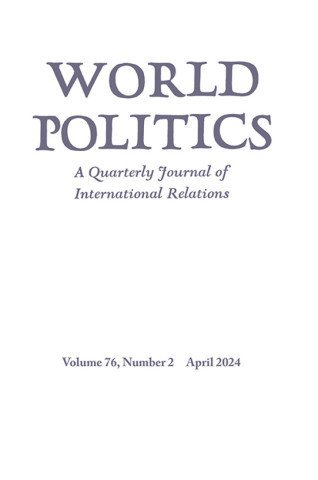作为制衡的正义
IF 2.5
1区 社会学
Q1 INTERNATIONAL RELATIONS
引用次数: 0
摘要
冲突解决的集中化和司法是国家形成的两个关键要素,但国家建设文献往往忽视了这两个要素。本文以殖民地墨西哥的印度总法院为例,研究司法行政的垄断问题。作者认为,该法院的发展和决策过程可以向我们展示法治是如何在高度独裁的背景下发展的。中央法院可以战略性地用来解决机构问题,限制地方精英的权力并监督国家机构。为了遏制这些行为者的权力,西班牙王室允许土著居民提出索赔并获得财产权。但这种访问仍然是有限的,并受到王室的战略考虑。作者的理论预测,在可能增加地方精英权力的情况下,更有可能对土著人口做出有利的裁决。这篇文章展示了在一个强大的统治者有兴趣对地方权力施加限制的情况下,法治可以出现的条件,以及他们对普通民众的潜在掠夺。它还强调了建立殖民机构背后的内生因素以及司法制度在殖民治理中的重要性。本文章由计算机程序翻译,如有差异,请以英文原文为准。
Justice as Checks and Balances
ABSTRACT The centralization of conflict resolution and the administration of justice, two crucial elements of state formation, are often ignored by the state-building literature. This article studies the monopolization of justice administration, using the historical example of the General Indian Court (gic) of colonial Mexico. The author argues that this court’s development and decision-making process can show us how the rule of law develops in highly authoritarian contexts. Centralized courts could be used strategically to solve an agency problem, limiting local elites’ power and monitoring state agents. To curb these actors’ power, the Spanish Crown allowed the indigenous population to raise claims and access property rights. But this access remained limited and subject to the Crown’s strategic considerations. The author’s theory predicts that a favorable ruling for the indigenous population was more likely in cases that threatened to increase local elites’ power. This article shows the conditions under which the rule of law can emerge in a context where a powerful ruler is interested in imposing limits on local powers—and on their potential predation of the general population. It also highlights the endogenous factors behind the creation of colonial institutions and the importance of judicial systems in colonial governance.
求助全文
通过发布文献求助,成功后即可免费获取论文全文。
去求助
来源期刊

World Politics
Multiple-
CiteScore
8.40
自引率
0.00%
发文量
24
期刊介绍:
World Politics, founded in 1948, is an internationally renowned quarterly journal of political science published in both print and online versions. Open to contributions by scholars, World Politics invites submission of research articles that make theoretical and empirical contributions to the literature, review articles, and research notes bearing on problems in international relations and comparative politics. The journal does not publish articles on current affairs, policy pieces, or narratives of a journalistic nature. Articles submitted for consideration are unsolicited, except for review articles, which are usually commissioned. Published for the Princeton Institute for International and Regional Affairs
 求助内容:
求助内容: 应助结果提醒方式:
应助结果提醒方式:


